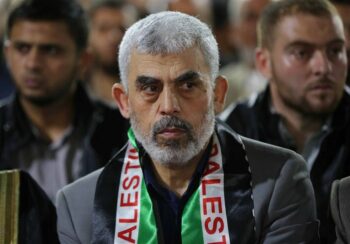By Mark Ellis —

Yahya Sinwar, the Hamas leader who planned the horrible attack against Israel October 7th, once languished in an Israeli jail, and was released after 22 years of confinement in a mass prisoner exchange for one Israeli soldier, Gilad Shalit.
But before his release, Sinwar complained of severe pain in his head, and learned he had a brain tumor during a medical check-up in 2004, which caused him to fear for his life.
“When a tumor was found in Sinwar’s head, he was terribly afraid,” Betty Lahat, the former warden in Hasharon Prison, told The Mirror. “The man fell apart. “The guy started crying, really crying and begging me to tell him he’d come out of it and that he wouldn’t die.”
“After the surgery, I told him, ‘The State of Israel that you’re so against saved your life’.
Sinwar was serving four life sentences for organizing the murders of four Palestinians he suspected of collaborating with Israel.
Dr Yuval Bitton was part of the medical team that saved the life of Sinwar. Dr. Bitton revealed his own nephew is now one of the hostages being held captive in Gaza, according to The Mirror.
“The fact that we saved his life cost hundreds of children and old people their lives. We later discovered that my nephew is now in Gaza, a captive of the man whose life we saved.”
Dr. Bitton’s nephew, Tamir Adar, 38, who has two young children, was captured from a kibbutz with his grandmother, Yaffa Adar, 85. She was photographed being taken away by terrorists in a golf cart, while she displayed a resolute expression on her face. The great-grandmother was one of the first released in a prisoner exchange November 24th.
Thousands have died as a result of Sinwar’s evil plotting. “That was Sinwar’s way of saying thank you to us,” Dr. Bitton said bitterly. “If I was ever to see this man again face to face, I would say, ‘Only you, Yahya Sinwar, have the blood of your brothers and sisters in the Gaza Strip on your hands.
“You knew what you were bringing on the poor people of Gaza. It’s you who has brought about the end of Hamas’.”
The former warden describes Sinwar as a man with a sadistic nature. “Even before his arrest, he led by fear and terror. He would dig holes, then throw in people he suspected were against him, pouring cement on them while they were still alive. He’s a coward, he’s cruel and he’s callous. When I see his bluster in Gaza, I ask myself how this chicken became a hero.”
Sinwar was the only Palestinian prisoner in the 2011 exchange who refused to sign a pledge never to engage in terrorist activity again.
Dr Bitton said: “I warned the internal security people we should never have let Sinwar go in 2011. He was just far too dangerous, a total psychopath.”
The tragic irony of an evil man mercifully saved, only to return in an unexpectedly vengeful way, is a biblical theme, as portrayed in the life of King Saul, who was ordered to kill all the Amalekites by the Prophet Samuel, but allowed at least one man to remain alive, who had some role in Saul’s death on Mt. Gilboa, as seen in the account in 2 Samuel:
1 After the death of Saul, David returned from striking down the Amalekites and stayed in Ziklag two days. 2 On the third day a man arrived from Saul’s camp with his clothes torn and dust on his head. When he came to David, he fell to the ground to pay him honor.
3 “Where have you come from?” David asked him.
He answered, “I have escaped from the Israelite camp.”
4 “What happened?” David asked. “Tell me.”
“The men fled from the battle,” he replied. “Many of them fell and died. And Saul and his son Jonathan are dead.”
5 Then David said to the young man who brought him the report, “How do you know that Saul and his son Jonathan are dead?”
6 “I happened to be on Mount Gilboa,” the young man said, “and there was Saul, leaning on his spear, with the chariots and their drivers in hot pursuit. 7 When he turned around and saw me, he called out to me, and I said, ‘What can I do?’
8 “He asked me, ‘Who are you?’
“‘An Amalekite,’ I answered.
9 “Then he said to me, ‘Stand here by me and kill me! I’m in the throes of death, but I’m still alive.’
10 “So I stood beside him and killed him, because I knew that after he had fallen he could not survive. And I took the crown that was on his head and the band on his arm and have brought them here to my lord.”
11 Then David and all the men with him took hold of their clothes and tore them. 12 They mourned and wept and fasted till evening for Saul and his son Jonathan, and for the army of the Lord and for the nation of Israel, because they had fallen by the sword.
13 David said to the young man who brought him the report, “Where are you from?”
“I am the son of a foreigner, an Amalekite,” he answered.
14 David asked him, “Why weren’t you afraid to lift your hand to destroy the Lord’s anointed?”
15 Then David called one of his men and said, “Go, strike him down!” So he struck him down, and he died. 16 For David had said to him, “Your blood be on your own head. Your own mouth testified against you when you said, ‘I killed the Lord’s anointed.’” (2 Samuel 1:1-15)




[…] Originally Published by God Reports. […]
Comments are closed.